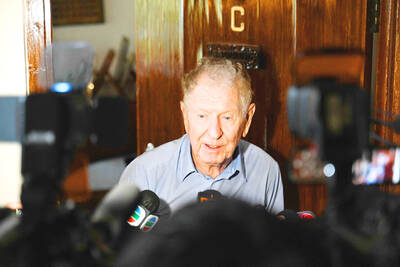A Saudi prisoner was found dead in his cell at Guantanamo Bay after apparently taking his own life, the US military said, a possible fourth suicide at the US detention camp that prisoner rights advocates blamed on the US government.
The US military's Southern Command said the detainee was found dead on Wednesday in his cell at the "war on terror" detention center in the US naval base in southeastern Cuba.
"The detainee was pronounced dead by a physician after all lifesaving measures had been exhausted," the US Southern Command said in a statement describing the death as "an apparent suicide."
The US military said an investigation had been launched.
A cultural advisor was assisting the military to ensure that the remains were handled in a culturally sensitive and religiously appropriate manner, the statement said.
Faced with mounting calls at home and abroad for the camp to be shut down, Southern Command said that "the mission of detention and interrogation at Guantanamo continues."
"This mission is vital to the security of our nation and our allies and is being carried out professionally and humanely by the men and women of Joint Task Force Guantanamo," it said.
The Center for Constitutional Rights (CCR), a US legal rights group that represents detainees being held without charge, blamed the US government for the Saudi prisoner's death.
"The United States government is responsible for this man's death and must be held accountable," Wells Dixon, staff attorney for CCR's Guantanamo Global Justice Initiative, said in a statement.
"The military has increasingly held people in solitary confinement and continued to refuse to allow independent psychological evaluations," Dixon said.
"By refusing to hear the men's cases or exercise any oversight of their conditions, the judiciary contributed further to the desperation of the detainees and Congress, in failing to restore the fundamental right of habeas corpus, dealt the final blow," he said.
CCR said that the US government has provided "extremely limited" information to the families and lawyers of dead detainees and challenged an attempt to preserve evidence related to the deaths.
In June last year, two Saudis and a Yemeni hanged themselves with sheets at the camp.
US officials had stirred worldwide outrage at the time by describing those suicides as "an act of asymmetric warfare" and "a good PR move" on the part of terror suspects.
Human rights groups say there have been dozens more suicide attempts by detainees, many of whom are held in isolation.
Last month the US Navy said 13 detainees who staged a hunger strike were force-fed through tubes.
Navy Commander Robert Durand described the hunger strike as "a tactic taught in the al-Qaeda training manual ... designed to elicit maximum media attention."
The detention camp is located on a sprawling US Navy base in southeastern Cuba.
In all, about 800 prisoners have passed through the camp since it opened. Around 380 inmates are still held at the navy base, some having spent as long as five years there without being charged.

MORE VISITORS: The Tourism Administration said that it is seeing positive prospects in its efforts to expand the tourism market in North America and Europe Taiwan has been ranked as the cheapest place in the world to travel to this year, based on a list recommended by NerdWallet. The San Francisco-based personal finance company said that Taiwan topped the list of 16 nations it chose for budget travelers because US tourists do not need visas and travelers can easily have a good meal for less than US$10. A bus ride in Taipei costs just under US$0.50, while subway rides start at US$0.60, the firm said, adding that public transportation in Taiwan is easy to navigate. The firm also called Taiwan a “food lover’s paradise,” citing inexpensive breakfast stalls

US PUBLICATION: The results indicated a change in attitude after a 2023 survey showed 55 percent supported full-scale war to achieve unification, the report said More than half of Chinese were against the use of force to unify with Taiwan under any circumstances, a survey conducted by the Atlanta, Georgia-based Carter Center and Emory University found. The survey results, which were released on Wednesday in a report titled “Sovereignty, Security, & US-China Relations: Chinese Public Opinion,” showed that 55.1 percent of respondents agreed or somewhat agreed that “the Taiwan problem should not be resolved using force under any circumstances,” while 24.5 percent “strongly” or “somewhat” disagreed with the statement. The results indicated a change in attitude after a survey published in “Assessing Public Support for (Non)Peaceful Unification

The CIA has a message for Chinese government officials worried about their place in Chinese President Xi Jinping’s (習近平) government: Come work with us. The agency released two Mandarin-language videos on social media on Thursday inviting disgruntled officials to contact the CIA. The recruitment videos posted on YouTube and X racked up more than 5 million views combined in their first day. The outreach comes as CIA Director John Ratcliffe has vowed to boost the agency’s use of intelligence from human sources and its focus on China, which has recently targeted US officials with its own espionage operations. The videos are “aimed at

Four former Hong Kong opposition lawmakers jailed in the territory’s largest national security case were released yesterday after more than four years in prison, the first among dozens convicted last year to regain their freedom. Former legislators Claudia Mo (毛孟靜), Jeremy Tam (譚文豪), Kwok Ka-ki (郭家麒) and Gary Fan (范國威) were part of a group of 47 public figures — including some of Hong Kong’s best-known democracy advocates — who were charged with subversion in 2021 for holding an informal primary election. The case fell under a National Security Law imposed on the territory by Beijng, and drew international condemnation and warnings